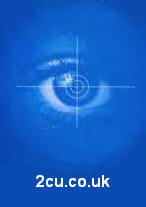
<Please click here to go back to smaller print>
Age-Related Macular Degeneration
Signs and Symptoms
-
Loss of ability to see objects clearly
-
Difficulty reading
-
Distorted vision - straight lines appear wavy
-
Central vision blocked by a dark area
If you have any of these symptoms of sudden onset you should see your eye specialist immediately, especially if the last two occur together. Having one or more of these symptoms does not necessarily mean you have macular degeneration.
What is Age-Related Macular Degeneration?
Age-related macular degeneration (AMD or ARMD) is a disease of usually unknown cause that affects the adult eye, specifically the retina. It is not painful but patients may become sensitive to light or see lights that are not there and this may cause some discomfort.
The macula is found at the centre of the retina at the back of the eye where the incoming rays of light are focused. The macula is very important and is responsible for our central vision, which is needed for detailed activities such as reading, writing and watching television and our ability to recognise faces and appreciate colour.
It usually involves both eyes, although one may be affected more than the other. Patients with AMD experience a decrease in their central vision, resulting in distortion, blur and darkness of vision.
Macular degeneration does not result in total blindness and people affected retain enough useful peripheral (side) vision to live independently.
Who is most likely to get AMD?
The greatest risk factor is age. Studies show that people over the age of 60 are clearly at greater risk than other age groups.
![]() What
are dry stage and wet stage macular degeneration?
What
are dry stage and wet stage macular degeneration?
There are two types of AMD - 'dry type' and 'wet type' and this will be determined after an examination by an Ophthalmologist.
In dry stage macular degeneration, the most common form of the disease, macular tissues thin and slowly lose function. There is no available treatment, as yet, for 'dry type' AMD. Vision is less affected.
The wet stage of the disease is less common but usually more damaging than the dry stage. Wet macular degeneration is caused by abnormal blood vessels that grow behind the macula. These blood vessels frequently leak, causing scar tissue to form. Left untreated, wet macular degeneration may rapidly worsen.
Diagnosis
Macular degeneration is diagnosed by a dilated eye examination. Patients suspected of having wet macular degeneration will need a fluorescein angiogram which is performed by injecting a special dye into a vein in the arm. Photographs are then taken as the dye passes through the blood vessels in the retina, so the abnormal vessels may be identified.
Treatment
No treatment can restore sight that has already been lost due to dry or wet stage macular degeneration. Most cases of macular degeneration do not need to be treated and patients maintain good vision, but should be monitored at regular intervals.
In a small number of patients, if detected early enough, laser treatment (photocoagulation) can be effective in treating 'wet type' AMD, as it can occasionally arrest the progress of macular disease in a minority of patients. The laser treatment seals off leaking blood vessels, slowing or preventing additional damage to the eye.
Photodynamic therapy with Visudyne (PDT) is carried out by Mr Paul Rosen in Oxford.
Visudyne therapy cannot restore vision lost to AMD,
but it confines the retinal damage and slows the progression of the disease.
Since A non-thermal or "cold" laser is used in Visudyne therapy and therfore
normal, healthy cells and tissue are not damaged, only abnormal blood vessels.
Prevention
Early detection is the most important goal in the management of macular degeneration. Eating a balanced diet including beta carotene and protecting your eyes from the harmful effects of ultraviolet exposure from the sun are current recommendations.
It has been suggested that nutritional supplements may play a role in helping people at high risk from developing advanced AMD. Alcon Laboratories (www.alconlabs.com/gb) have developed a formula with Lutein and Zeaxanthin (ICaps) and, although they cannot cure AMD, they may be beneficial.
The Macular Disease Society (www.maculardisease.org) may be contacted at PO Box 16 Denbigh LL16 5ZA. 0800 328 2849 (free helpline).
Home / Contact / Site Map / Our People / Eye Conditions / Links / Cataract Surgery / Refractive Surgery / The Eye Explained / News
Page last updated on Saturday, 25 June 2005 12:36:26
Site designed and edited by Web Designer
